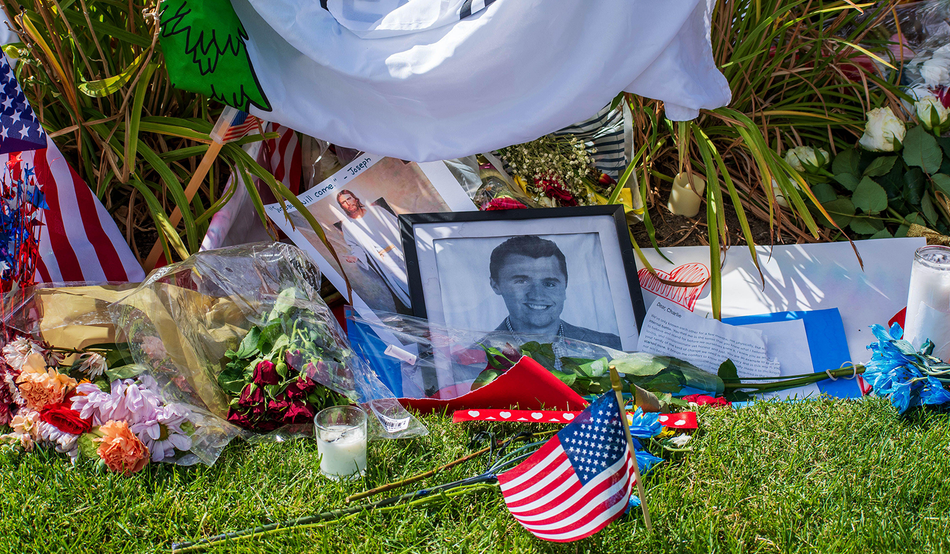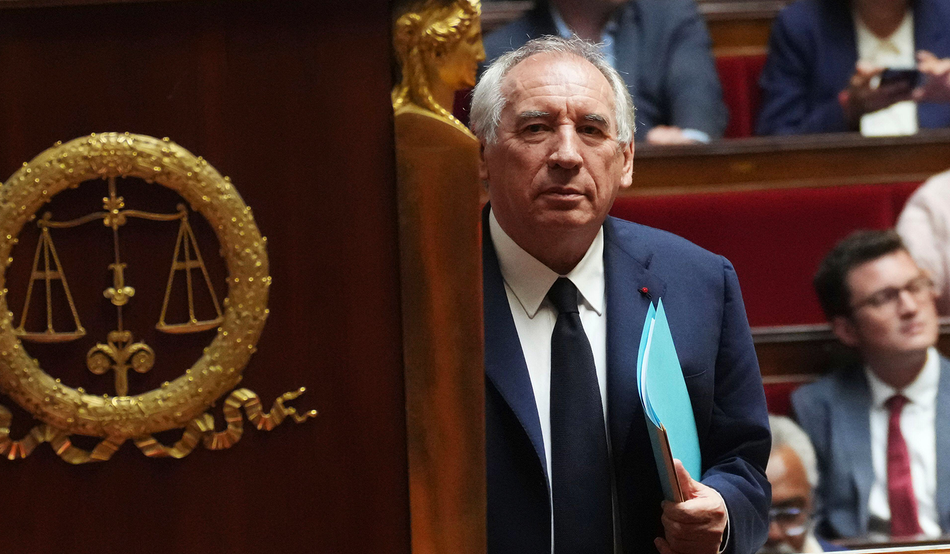The United States is careening off a precipice, and its democracy may not survive. The assassination of Charlie Kirk, the 31-year-old scion of America’s young conservative movement, is the highest-profile political assassination in my country since Senator Bobby Kennedy’s in 1968. Instead of leading responsibly at such a fraught time, Donald Trump and JD Vance are moving American democracy ever closer to the edge.
Before a single reported fact about the shooter had emerged, Trump blamed “radical left political violence”, vowing retribution against unnamed “organisations” that he claimed supported the attack. On Monday, Vance delivered a more chillingly specific diatribe. In a pre-recorded statement, he inveighed against “terrorist sympathisers”, labelling George Soros’ Open Society and the Ford Foundation “terrorism” promoters because they fund the Nation, which published a piece entitled “Charlie Kirk’s Legacy Deserves No Mourning”. This was despite the fact that its author wrote specifically that she “won’t celebrate his death”. On Wednesday, ABC cancelled Jimmy Kimmel Live! just hours after the Trump-controlled Federal Communications Commission (FCC) threatened to cancel ABC’s broadcasting licence. The show’s host seems to have angered the Trump administration by erroneously suggesting that Kirk’s assassin was a Trump supporter.
Kirk was a Trump ally who combined the charismatic appeal of the likes of Zohran Mamdani for America’s young left, with the gravity of having arguably won election-swinging states for Maga through Kirk’s organisation, Turning Point USA. Since the killing of Kirk, Trump and his most powerful allies have been forcing his national martyrdom down Americans’ throats, while themselves surpassing the most censorious aspects of the “cancel culture” they once derided. The attorney general, Pam Bondi, has promised a federal witch hunt against Kirk-critical “hate speech”, a concept with no legal definition under US law. Elon Musk reshared a post on X, which claimed baselessly that Kirk’s assassination was “100 per cent.... carried out by a radical transgender terror cell”, while Trump’s son, Don Jr., hallucinated to Fox News that “a transgender lunatic pumped up on hormones since they were three year-olds” [sic] has committed every mass shooting in the US over the past two years.
America’s de-democratisation has been well underway since Trump’s return to office. Such statements will only speed things up. And the risks of what experts term the US’s descent toward competitive authoritarianism make it especially challenging for scholars of political violence and democratic backsliding, like myself, to articulate a controversial but crucial appeal to the left.
That is: instead of decrying hagiographies of Kirk, our time would be better spent communicating empathy to his supporters, redoubling our ironclad defence of free speech no matter how offensive the views, and confronting growing support for political violence on the left. Leading Democrats, such as Zohran Mamdani and Bernie Sanders, have done the first two. But we, the people, too often have not. American democracy’s survival could depend on the left’s ability to see the big picture at this perilous juncture.
Political polarisation correlates strongly with democratic backsliding. As empathy gaps between opposing sides grow, so does the risk of violence, political breakdown and actual war. Tragedies like Kirk’s assassination offer opportunities for building bridges with people with whom we disagree. This can, through genuine displays of human sympathy, help a polity claw its way back from mutual demonisation. Tunisia, for example—which, from 2011 to 2021 became the Arab world’s first democracy—could have slid back into authoritarianism much sooner had its leaders across the political spectrum not expressed an outpouring of grief for leftist and Arab nationalist politicians who were assassinated by jihadists hell-bent on destroying its fledgling democracy in 2013.
Research shows both sides of the aisle in American politics “vastly overestimate” the prevalence of their opponents’ extreme views, which exacerbates polarisation. Clashing interpretations of Charlie Kirk’s statements demonstrate this. At an FBI press conference last week, the governor of Utah, Spencer Cox, emphasised Charlie’s better angels, highlighting his injunctions to forgiveness, belief in free debate as democracy’s cornerstone and defence against political violence, and his advice to seek solace through family and prayer.
On the left, meanwhile, the focus seemed to be on the posthumous “whitewashing” of his views. Instead of building on Cox’s words as a positive alternative to Trump’s divisiveness, many on the left in and beyond my circles lambasted the governor for not telling the whole truth about Kirk’s legacy. Of course it matters that we know what Kirk stood for (and in his ubiquitous content online he made his opinions perfectly clear). But this was a missed opportunity to reinforce civil attitudes and reduce division. Likewise, many people shared especially heinous quotes of Kirk’s that were made even worse through misquoting or being taken out of context. Exaggerating the other side’s views does not help guard against whitewashing, and it discourages the formation of bipartisan bonds at a time when broad coalitions to defend democracy are imperative.
We also need to own up to the excesses of left-wing cancel culture over much of the past decade. These flourished partly as a function of what academics refer to as “reciprocal radicalisation”—a phenomenon often worsened by social media algorithms—whereby Trump’s hateful language, plus the shocking resurgence of white supremacist rallies such as Charlottesville in 2017, fed the formation of illiberal new leftisms. Normalisation of “punching Nazis” and assertions like “hateful speech is violence” and “silence is violence” exemplified this trend, blurring the bright line that distinguishes actual, physical violence as categorically worse than, and an unacceptable response to, offensive speech.
Perceived victimhood is a major push factor in those who fall into violent and nonviolent extremism. Perceived repression of right-wing speech is what catapulted Kirk—who strode onto campuses saying things that many people felt, but feared voicing—to prominence, electrifying millions of Americans. Winning those people back requires recommitting to free speech in word and deed. Many Americans crave more “authentic” representatives of the Democratic party with the confidence, good humour and apparent zest for free speech to joust with wildly diverse interlocutors in unscripted, long-form interviews. During last year’s election Kirk, Vance and Trump did that while Kamala Harris played it safe. More Democrats will demonstrate their commitment to free speech by debating with diverse detractors if the left encourages, rather than denounces, its few leaders who have defended their ideas on territory perceived as hostile.
We must also confront the reality that—while Americans overwhelmingly reject political violence, and right-wing and jihadist extremists have perpetrated the vast majority of lethal attacks in the US—it is also true that political violence is a growing problem on America’s left. Recent instances of political violence justified by a sub-section of the US left include Hamas’ 7th October 2023 attack and the killing of a health insurance executive, with many hailing the chief suspect Luigi Mangione as a modern-day Robin Hood.
Recent acts of left-coded political violence include the 2017 shooting of Republican congressmen, the 2022 assassination plot against Justice Brett Kavanaugh, the 2024 attempted assassination of Trump in Florida, and the 2025 Jewish Museum shooting. Charlie Kirk’s alleged assassin—a young man who reportedly inscribed anti-fascist messaging on his bullets and told his trans partner that Kirk’s hate “can’t be negotiated out”—appears to be the latest. Indeed, polls have found higher tolerance of political and, until this year, speech-stopping violence on the left, especially among youth.
Most importantly, perhaps, political violence correlates most strongly not with party identification but with psychological and social factors that transcend partisan divides. These include perceived victimhood, fearful anxiety, feelings of powerlessness, belief that government is corrupt, support for authoritarianism (especially prevalent on the right) and support for populist “us vs them” outlooks that demonise elites (increasingly prevalent on the left, but also evident on the populist right). Such risks are intensifying on the left after months and months of Trump’s divisive rhetoric, corruption scandals, threats against political opponents and exaltation of the 6th January rioters.
Empathy, commitment to free speech and consistently principled opposition to political violence can help stop this escalation, restoring confidence in the Democratic party, whose approval ratings have hit record lows. Totalising beliefs that percolate on the left, along the lines of “Trump is a literal Nazi”, “everyone who works at Israel’s embassy is guilty of genocide”, and “Kirk was genociding trans people”, create permission structures that can embolden political violence, a dynamic the left candidly acknowledges in relation to right-wing violence, but seems blind to when it comes to itself.
Just as the blood-soaked images from Gaza have radicalised people worldwide against Israel’s grave crimes, sometimes violently, so too will videos of Kirk, slain while speaking in a “freedom” T-shirt, with blood geysering from his neck, radicalise many on the right. We can all choose whether or not to break this cycle by championing empathy, free speech and intellectual honesty about political violence. Do we want to feel like we are in the right, or do we want to save democracy? The choice is ours.












